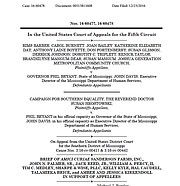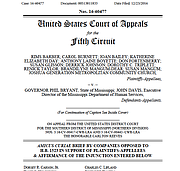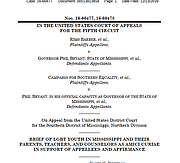Thursday, December 29, 2016
Protesters marched from the state capitol to the governor's mansion in early May to voice their disapproval of Phil Bryant signing House Bill 1523 into law. Photo by Arielle Dreher.
Mississippi business leaders, corporations, lawyers and locals denounced House Bill 1523 in eight legal briefs filed just before Christmas, supporting plaintiffs that want the 5th U.S. Circuit Court of Appeals to affirm the lower court's decision and deem the "Protecting Freedom of Conscience from Government Discrimination Act" unlawful.
Sanderson Farms Inc., the only Fortune 1000 company headquartered in the state, was one of several Mississippi-based companies that asked the 5th Circuit to deem House Bill 1523 unconstitutional due to its "depressing" effect on economic growth in the state.
"The law lacks a sincere secular purpose, and any attempt by the state to offer one now would be pretext, particularly given that HB 1523 undermines the state's primary policy goal of growing Mississippi's economy. The law will depress economic growth, discourage entrepreneurship, and damage existing businesses," the Sanderson Farms brief states.
Citing a Texas study among other research, the state's business leaders argue that laws like House Bill 1523 lead to significant damage. After Gov. Phil Bryant signed the bill into law, some states banned travel to Mississippi, and local business leaders said potential contractors backed out of pending projects.
"Remarkably, HB 1523 not only lacks any secular purpose; it is contrary to the Governor's and Legislature's primary (secular) policy of growing Mississippi's economy and creating jobs for Mississippians. HB 1523 could inflict a staggering amount of damage to Mississippi's economy—shrinking Mississippi's GDP, discouraging entrepreneurship, destroying jobs, and crippling Mississippi's tourism industry," the brief says.
Another brief, which both local businesses and national corporations in the state filed, condemns the bill's effect on not only business but also its own employees. Pfizer, Levi Strauss, IBM, CVS, Choice Hotels International, AIG, Bloomberg L.P. and other businesses denounced HB 1523 in their brief supporting the plaintiffs in the case. All of the companies have diversity and non-discrimination policies, their brief says, because they are good for their employees, customers and communities.
"Those same policies also benefit the Amici's (the companies') bottom lines. The Amici know firsthand the advantages these policies confer, and empirical studies confirm what the Amici know: that policies of openness and acceptance increase company value, proficiency, and profitability," the brief says. "Studies show that the Amici's policies make good business sense. Companies that embrace inclusive policies on sexual orientation and gender identity out-perform similarly situated businesses."
While private companies would not have to amend their diversity policies in their own organizations due to HB 1523, they acknowledge that the bill could easily affect their employees.
"Though H.B. 1523 may not actively require the Amici that operate in Mississippi to amend those policies, the law threatens their employees' workplace productivity by subjecting them and their friends, families, and loved ones to discrimination outside the workplace," the brief states.
Several other advocacy and religious groups filed amicus briefs in support of the plaintiffs challenging HB 1523, and the Southern Poverty Law Center filed a brief on behalf of young Mississippians, or those that work with young Mississippians, who have experienced violent treatment and threats due to their gender identity or sexual orientation.
Marion O'Sullivan, listed in SPLC's brief, grew up in Mississippi and is now away for college. During her time in high school, however, she was president of her high school's Gay-Straight Alliance club while at school and reported threats to her organization.
"(She) recalls a classmate who threatened to shoot participants at the Pride parade they were planning," the brief states. "When she reported the threat, others mocked her for taking the threat seriously."
The SPLC brief goes on to recount how LGBT youth around the state meet challenges, especially in a school environment, when looking for counseling services or other support.
Bryant and the executive director of the Department of Human Services, John Davis, both of whom appealed the district court's decision to the 5th Circuit initially, have asked for more time to file their response by Jan. 13.
They argue that House Bill 1523 is constitutional and that Mississippians should have "conscientious objector" status if they do not want to recognize LGBT citizens' rights to be married.
In their Oct. 20 appeal, they defend House Bill 1523's lawfulness, saying it protects Mississippians' religious freedom.
"The Court should hold that freedom of conscience is a 'fundamental right,' and that the government has no authority to coerce anyone to participating in a same-sex marriage ceremony," the appeal says.
To read more about House Bill 1523, visit jacksonfreepress.com/lgbt. Email state reporter at [email protected].



